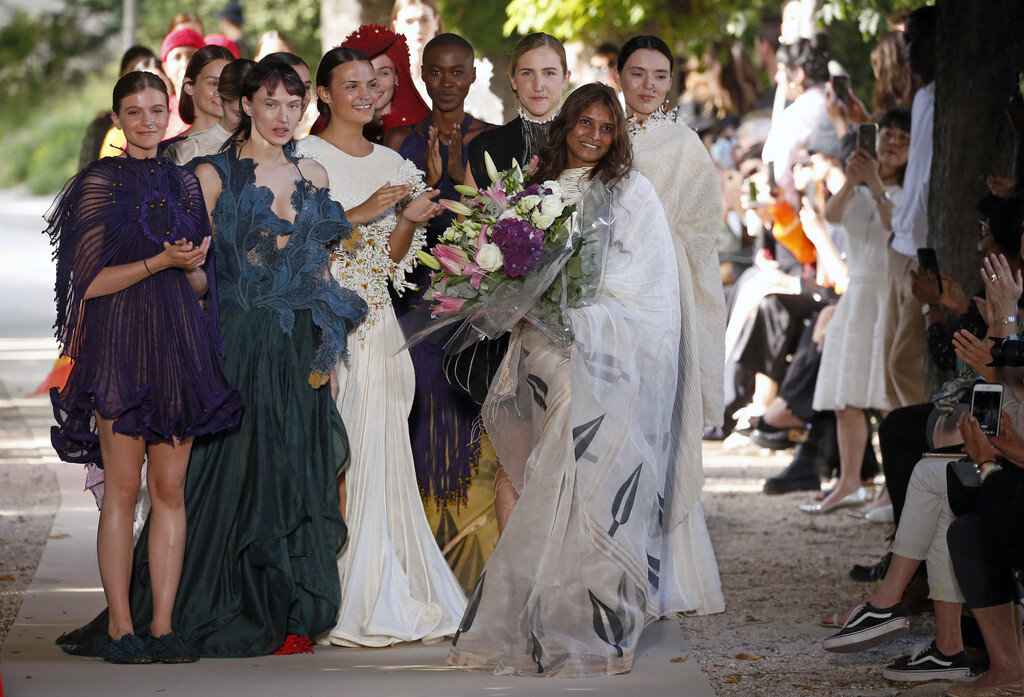GmbH Is Collaborating With Palestinians For A Free Palestine
Serhat Isik and Benjamin Huseby, the current creative directors of German luxury brand GmbH, have never shied away from political discourse. Their previous collections have been based on subjects as diverse as appropriation, whiteness, racial extremes, queer representation, trans rights, and immigration. Now they are championing a different cause: Free Palestine. In collaboration with Palestinian brand Trashy Clothing, both companies have created a capsule collection in support of Palestine and the injustice it is facing by the colonist state of Israel. Ready for pre-order, the capsule includes tops and garments manipulated with staple GmbH silhouettes and straps, and emblazoned with ‘Free Palestine’.
Based on the archival research of Trashy Clothing, the brands have picked “historical Palestinian art and activist graphics” as the fabric texture of their products, with proceeds going equally towards two Palestinian charities - alQaws, an organisation that supports LGBTQ+ and queer individuals, and The Land of Canaan Foundation, which focuses on reclaiming agriculture for small companies and farmers who have lost crops due to the occupation and conflict. Hoping to shed more light on the occupation and the devastating effects it is having on innocent Palestinians, this collection showcases the GmbH’s international efforts to make the world a better place.
The Charities and their Main Objectives
alQaws is a grassroots organisation that focuses on sexual and gender diversity in Palestinian society - at the forefront of Palestinian cultural and social change. The organisation focuses on building LGBTQ+ communities, promoting new ideas about the role of gender and sexual diversity in political activism, civil society institutions, media, and everyday life. With the help of funding, alQaws runs community centres and events in cities and rural areas across Palestine, as well as operating a national support hotline accessible online or via phone. In doing so, they have built partnerships and alliances in established cultural institutions and civil society organisations, creating innovative media campaigns to transform public discourse surrounding Palestinians and queer people.
“Our mission statement: At individual, community and societal levels, alQaws disrupts sexual and gender-based oppression, and challenges regulation of our sexualities and bodies, whether patriarchal, capitalist or colonial. We work collaboratively to transform Palestinian society’s perspectives on gender and sexual diversity, homosexuality and LGBT issues, and to struggle for broader social justice.”
The Land of Canaan Foundation was founded in 2013 in order to support farm communities and village-based cooperatives in Palestine. LOCT does this in partnership with the Palestine Fair Trade Association (PTFA) and the Canaan Center for Organic Research & Extension (CORE).
Their mission? “LOCT promotes the agricultural traditions of farming communities throughout Palestine, empowers working artisan women and small-scale farmers in their communities for economic security, and facilitates education, training and research programs for farm families and their communities to make their products accessible locally and globally.”
An Exploration into the Conflict between Palestine and Israel
In 1947, after more than two decades of British rule, the United Nations proposed a plan to partition Palestine into two sections: an independent Jewish state and an independent Arab state. The city of Jerusalem, which was claimed by both parties as the capital, was to remain international territory with special status by the UN. Jewish leaders agreed to this proposition, but many Palestinian leaders greatly opposed the movement, especially those who had been battling against Jewish and British interference since 1920.
In May 1948, less than a year after the Partition plan for Palestine was introduced, Britain withdrew from Palestine and Israel declared itself an independent state - implying a willingness to implement the Partition plan created by the UN. Almost immediately, neighboring Arab armies moved in to prevent the establishment of the Israeli state. A war ensued involving Israel and five Arab nations - Jordan, Iraq, Syria, Egypt and Lebanon. The war ended in July 1949, with Israel controlling more than two thirds of the former British mandate, while Jordan took control of the West Bank, Egypt, and the Gaza Strip.
In 1964, the Palestine Liberation Organization (PLO) was formed. Their purpose was to establish a Palestinian Arab state on the land previously administered under the British mandate, which they considered to be occupied illegitimately by the state of Israel. In the 1993 Oslo Accords, the PLO accepted Israel’s right to exist in exchange for formal recognition of the PLO by Israel - a high point in Israeli-Palestinian relations.
The Six-Day War was triggered during a volatile period of diplomatic friction and skirmishes between Israel and its neighbours. In April 1967, the clashes worsened after Israel and Syria fought a ferocious air and artillery engagement in which six Syrian fighter jets were destroyed. In the wake of this battle, the Soviet Union provided Egypt with inaccurate intelligence that Israel was moving troops in preparation for a full-scale invasion. This stirred Egyptian President Gamal Abdel Nasser to advance forces which proceeded to expel a United Nations peacekeeping force that had previously been guarding the border with Israel for over a decade. Israel Defence Forces, claiming self-defense, then launched a preemptive aerial attack against Egypt on June 5th 1967, resulting in large attacks from both parties. The Six-Day War, as it came to be called, resulted in major land gains for Israel, which took the Gaza Strip, the West Bank, the Sinai Peninsula and the Golan Heights. This occupation plays a pivotal role in the conflict that still continues today.
Over the next couple of decades, Palestinian anger would result in several protests against Israel and their developments both politically and socially. Riots, suicide bombings, and other attacks subsequently broke out in retaliation to continued Israel interference, ending any progress towards peace. Currently, Palestinians are still fighting for an official state that has been formally recognised by all countries to be their own. Although Palestinians occupy key areas of land, some Israelis - with their government’s blessing - continue to settle in areas that are agreed to be under Palestinian control. Many international rights groups consider such settlements illegal, with persistent conflict continuing to be the norm.
Fashion has always played a part in political exploration and conflict. As one of the main visual expressions of societal thought and feeling, it allows us to gauge international mood and perspective first-hand via clothing. Fashion has and will continue to play a fundamental part in showcasing community support and solidarity, especially in times of conflict and oppression. In doing so, it can project powerful messages via a creative memdium that influences on an international scale. GmbH is saying Free Palestine, and so should you.







In the wake of England’s UEFA loss against Italy, and the racist attacks on players that followed, MATERIAL reconsiders the history of the ‘three lions’ and its problematic connotations.